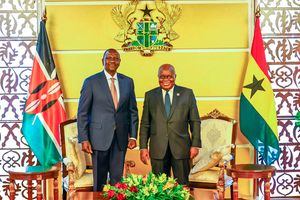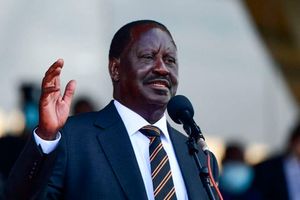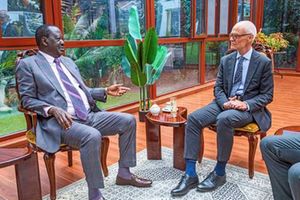
Azimio leader Raila Odinga during a past media briefing. He has expressed interest on the Africa Union Commission chairperson seat.
Former Prime Minister Raila Odinga has outlined his plan for Africa, detailing at least five key pillars for consideration should he clinch the Africa Union Commission (AUC) chairperson seat.
Mr Odinga who also served as African Union High Representative for Infrastructure Development says he has his job well cut out with potential priorities for consideration.
This comes at a time the election for the seat is set for February next year, and August 6, 2024 as the deadline to formally submit aspirants’ applications for the post.
In his vision statement for the AU, the Kenya’s opposition chief has drawn institutional reforms, financing of the AU, agenda 2063 and economic integration, global partnerships and peace and security, as his priority areas should he win the post.
Mr Odinga has embarked on a shuttle diplomacy to campaign for the seat among Heads of State and Government and taken part in continental and local engagements to rally for support.
During the just concluded Africa Fertliser and Soil Health summit held in Nairobi, Mr Odinga alongside President William Ruto engaged some of the visiting Heads of State and Government on the sidelines to sell his AUC chairperson bid.
But in this race, he also has a delicate balance at home as Azimio la Umoja One Kenya Coalition leader to checkmate the government which has endorsed his bid.
The campaign machinery mounted by Kenya representing the government and opposition team is yet to be officially unveiled, however President Ruto has been on a charm offensive in the region, lobbying for Mr Odinga when engaging with colleagues in the continent.
Already, Mr Odinga’s recent strong statements questioning the government’s response to the devastating floods rattled a section of Kenya Kwanza leaders led by National Assembly Majority Leader Kimani Ichung’wah and his senate counterpart Aaron Cheruiyot, who took him head on, reminding him that the government was backing his AUC chairperson bid.
The Azimio camp has, however, insisted it will not be gagged because of the support for the opposition leader’s African ambitions.
But despite dealing with local politics, Mr Odinga is glued to his continental contest, pitching for his suitability.
Economic integration
In addressing the agenda 2063 and economic integration, Mr Odinga aims at implementing substantial measures to improve the free movement of people across AU countries if he secures the AUC post.
Mr Odinga aims to expand the use of the AU passport within defined guidelines and ensure the complete implementation of the African Continental Free Trade Area (AfCFTA), including the rapid removal of non-tariff barriers.
“I envision to enhance effective and robust implementation of the 10-year plan (2024-34) of the Agenda 2063 and scale up application of the AU Passport within acceptable parameters,” Mr Odinga says.
He explains his plan to boost the role and place of Regional Economic Communities (RECs) as building blocks for continental integration by enhancing and aligning coordination between the AU and the RECs.
“Encouraging the implementation of industrialisation, ICT and agricultural strategies geared to Africa’s productivity and as aligned to the AfCFTA agenda will also be my key priority,” adds Mr Odinga.
On financing the AU plans, Mr Odinga sees the need for the organisation to fund its own programmes and operations. This, he says, is an enduring credibility concern for the African people.
“This aims at securing adequate, predictable and sustainable financing of the AU through its domestic resources to cover up to at least 75 per cent of its budget,” he says.
“Encourage the implementation, by member States, of the 0.2 per cent levy on eligible imports, as an alternative means of availing funds for the operations and programmes of the AU remains of paramount importance.”
He adds: “We envision strengthening the financial sustainability of the AU by mainstreaming members’ States role in financing to reduce dependence on foreign financial aid. It is reported that 62 per ent of the AU budget is financed from foreign sources.”
AU reforms
Mr Odinga also seeks to prioritise implementation of ongoing institutional reforms at the AU, within defined timelines and rationalised budget.
“I will focus on an energised and realigned African Union that is performance based, embracing annual continuous improvement.”
“An African Union that is visible, effective and delivers results in a measurable manner, that which, attracts and deploys top African human resources to lead, manage and or advise the AU institutions,” he says.

The African Union headquarters in Addis Ababa, Ethiopia.
Mr Odinga also underscored the need for upgrade and deployment of modern ICT infrastructure for good governance in both public and private institutions.
He has vowed to embark on programmes that enhance knowledge management and its application within the AU by retracing, rebuilding and providing structured access to the continent and organisation history, information and record.
“We shall reclaim the AU’s global status as a pre-eminent continental organization that effectively represents and advances Africa’s interests on the international stage,” he says.
He promises to review, identify, secure and expand specific benefits for the AU member States in each of the existing benefits for enhanced and dynamic partnerships and develop robust methods for a more effective implementation of actions and achieving clear measurable outcomes of each partnership in defined timelines.
Peace keeping
Security, he explained, is a key plank of his vision, promising to strengthen the African Peace and Security Architecture (APSA) for sustainable and durable peace.
“This explicitly entails adequate investments in the continental peace and security architecture, which in itself is the security for sustainable development.”
The former premier has vowed to work towards retaining and strengthening the body of the African Union as a family of nations to restore the Union’s ability and stature in resolving and averting conflict.
Also Read: What roles does the AUC chairperson perform?
In strengthening the AU institutions, Mr Odinga seeks to champion the repealing of the AU constitutive act to harmonise and clarify the functions of the various organs including the AU commission and Pan–African Parliament.
On the infrastructural front, the ODM leader argues that it is imperative for the continent to integrate through infrastructure.
Infrastructure development in Africa is anchored in the AU Agenda 2063, Programme for Infrastructure Development in Africa (Pida), 2012 and Presidential Infrastructure Champion Initiative (Pici) infrastructure frameworks.
Mr Odinga argues that despite Africa having implemented the First Pida Priority Action Plan for the last 10 years, the continent is yet to meet her infrastructure demands.
“The key challenges are shortfall in financing infrastructure investment programmes especially cross border programmes, delays in project preparation slowingexecution and low ownership of infrastructure projects by Regional Economic Communities,” he says.
Mr Odinga explains that he will advocate for adequate resourcing allocation to speed up infrastructure project preparation and make them bankable.
“This will hasten executions of the projects and allow Africa to attain sustainable and inclusive economic growth that spur employment, wealth generation and realization of The African Union (AU) Agenda 2063.”
Mr Odinga notes that support of trade liberalisation policies will be prioritised to enhance completion and implementation of cross border infrastructure projects.
“This will allow easy movement of goods, services and human capital facilitating cheap input to support production in key sectors of the economy both from the supply and demand side of the economy,” he says.

Azimio la Umoja leader Raila Odinga speaks to the media in Nairobi on February 15, 2024 when he formally declared his interest in the African Union Commission chairmanship.
Africa, Mr Odinga holds, must be able to feed itself, adding that at the moment, it is not on track to meet the food security and nutrition targets of the Sustainable Development Goal 2 on Zero Hunger for 2030.
The impact of Covid-19 pandemic, the war in Ukraine and Middle East, he says, have only worsened the situation.
He says: “This makes it imperative for African governments to hasten their efforts if they are to achieve a world without hunger and malnutrition by 2030.
Malabo Declaration
“The Comprehensive Africa Agriculture Development Programme (CAADP) provides Africa’s policy framework for agricultural transformation, wealth creation, food security and nutrition, economic growth, and prosperity for all.”
He promises to spearhead the implementation of CAADP and Malabo Commitments to accelerate Agricultural Growth and Transformation.
At the African Union Summit in Malabo, Equatorial Guinea in June 2014, Heads of State and Government adopted a set of concrete agriculture goals to be attained by 2025.
Dubbed the ‘Malabo Declaration on Accelerated Agricultural Growth and Transformation for Shared Prosperity and Improved Livelihoods,’ it was a set of new goals showing a more targeted approach to achieve the agricultural vision for the continent which is shared prosperity and improved livelihoods.
The Malabo Summit reconfirmed that agriculture should remain high on the development agenda of the continent.
“We shall encourage provision of high quality supply of agricultural inputs to achieve increased productivity for a resilient food system government to boosting intra-African trade in agriculture commodities and services and promote value chain projects to encourage and increase value of agricultural export,” he says.
Mr Odinga said he will support expansion ICT penetration in Africa by encouraging governments to improve Digital and Telecommunication Infrastructures Connectivity through provision of investment incentive for businesses.
“We shall promote local content development and knowledge transfer; and explore the use of universal service funds to reach out to the rural areas to open them for the PPP initiatives.”
He promises to rally AU member States support digital infrastructure development, regulation formulation and utilisation to entrench digital transformation and use of Artificial Intelligence in promoting economic growth and development.
The opposition leader notes that Africa also needs to take the lead in provision of affordable and renewable energy.
The continent, he argues, has energy infrastructure deficit, despite Africa's tremendous energy production and distribution potential.
“Africa's current total installed capacity of 145 GW is only a fraction of the 700 GW which is the target by 2040. The cost per unit is 60 to 80 times per unit morethan rates in developed countries,” he says.
Clean energy
He promises to advocate for penetration of affordable and clean energy though financing of projects under hydro, solar, wind power and blue energy to support rural electrification .
He also says he will lobby for establishment of regional centres of excellence to promote innovative technologies and provide opportunities for peer learning across the continent.
“We shall promote and encourage trade on locally manufactured goods within and outside side the continent,” he adds.











